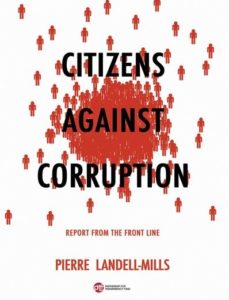
“Citizens Against Corruption – Report from the Front Line” draws on over 200 case studies that describe impressive initiatives undertaken over the past decade by 130 civil society organizations (CSOs) in 53 countries which engage directly with public agencies to stop the bribery and extortion that damages peoples’ lives and obstructs social and economic progress.”
Examples from some of the poorest countries show how a single CSO initiative can save several million dollars. Several million such initiatives can transform the way government does business, making public agencies accountable to those they serve. The message is clear: aid donors need to radically rethink their assistance for governance reform, tilting it dramatically in favor of supporting CSOs.
The book is in four parts.
Part 1 analyses the role citizens can play in fighting corruption and promoting good governance and briefly tells the story of the Partnership for Transparency Fund (PTF).
Part 2 presents countries studies from India, Mongolia, Philippines, and Uganda – each with its unique history and distinctive circumstances – to illustrate activities undertaken by CSOs to root out corruption. These describe the tools and approaches that CSOs are using successfully to build pressure on corrupt public agencies to become transparent and accountable.
Part 3 addresses key themes—strengthening the rule of law, putting in place effective national anti-corruption strategies and institutions, making public buying and selling honest, promoting grass roots monitoring of public expenditures and the provision of public services, mounting media campaigns to expose and defeat corruption, and empowering ordinary citizens to keep watch on what actually happens at the point of delivery of public services.
Part 4 summarizes what has been learnt and explores the potential, as well as the risks and limitations of the civic activism in a world where greed and dishonesty is the norm—talking to power. Finally, the book explores the opportunities and dangers faced by aid donors in supporting local CSOs and charts a way forward.
Notes Landell-Mills: “When we put together all the stories we have of citizens making a real difference often with very few resources, it becomes evident that we have a true revolution in the making. Individual initiatives may be impressive, but they are inevitably limited in time and space. But if countless such initiatives across the globe were aggregated, then we would soon reach the ‘tipping point’ where the relationship of citizens to their government starts to shift from deliberate opacity and lack of accountability to one where public officials will not dare to abuse their power or steal the common wealth. Modern information technology and an ever growing proportion of citizens aware of what is happening and no longer willing to tolerate misuse of power will speed this process forward.”

